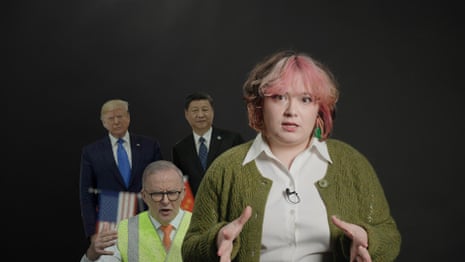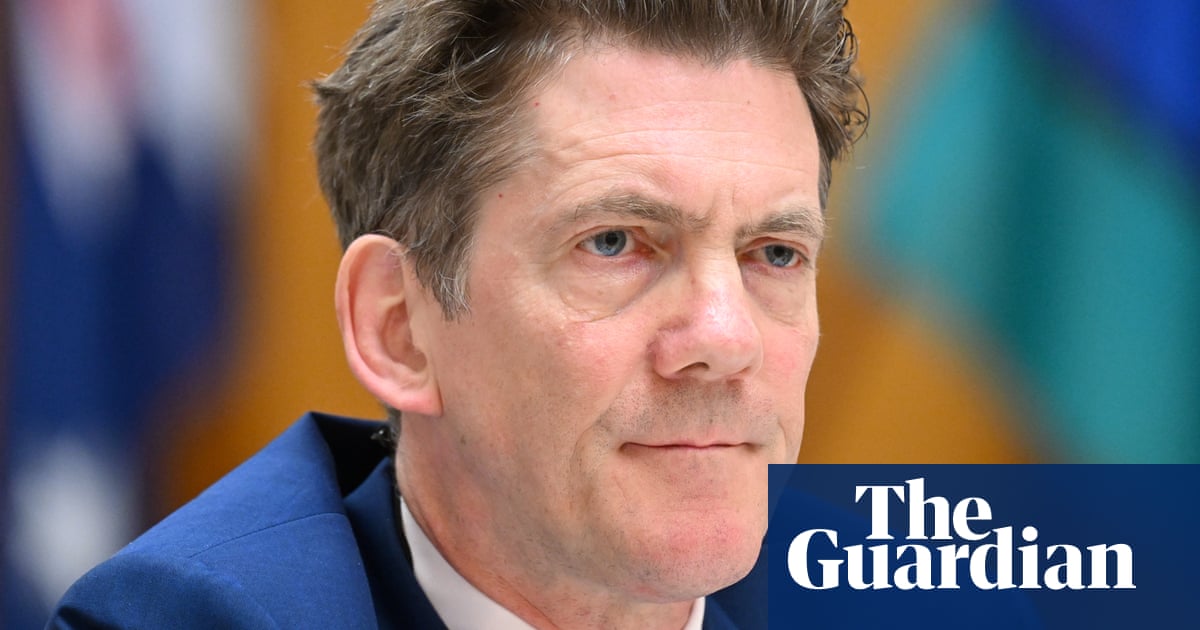Labor is making urgent representations to the White House about Donald Trump’s threat to impose 200% tariffs on drug imports to the US, amid growing warnings the US president’s growing trade war will seriously damage the global economy.
Trump said on Wednesday that the punishing new border levies would be announced “very soon” and come with a transition period that could last more at least a year, after sustained pressure from the US pharmaceutical industry over price controls on common drugs in countries like Australia.
The treasurer, Jim Chalmers, called the latest round of tariffs very concerning on Wednesday, while the Reserve Bank deputy governor, Andrew Hauser, warned they were set to have a “profound” impact on the international economy.
Speaking at the Australian Conference of Economists, Hauser said it was “puzzling” that investors seemed unperturbed by the tectonic shifts emanating from Washington.
“How worried are we about it [Trump’s trade policies]? We are very, very focused on it, the level of uncertainty is clearly elevated,” he said.
“The first round effects of these changes in US tariffs are probably relatively minor, but the effects on a broader global economy are profound.”
A former senior executive at the Bank of England, Hauser compared the tariff push to the experience of Brexit, to explain how it can take years for the full impact of major shocks to become clear.
“The day after Brexit happened, everyone thought the world would end, and it didn’t. But 10 years on, you’re seeing the profound effects of some of those changes for sustainable growth rates and for fundamental things in the economy.”
Trump said the pharmaceutical tariffs would be introduced in a year or 18 months.
“After that they’re gonna be tariffed if they have to bring the pharmaceuticals into the country at a very high rate, like 200%.”
After this week delaying the lifting of a pause on his so-called “retaliatory tariffs” against more than 100 countries until 1 August, he also announced a plan to hit copper imports into the US with a 50% tariff.
Australia’s copper exports to the US are worth about $50m annually and make up less than 1% of total sales of the metal.
But Minerals Council boss Tania Constable warned the tariffs would disrupt trade and undermine investor confidence around the world. She called for Australian exporters to diversify their markets.
“As geopolitical risks rise and others turn inward, Australia has the opportunity to step forward by deepening and securing supply through trade partnerships, expanding export markets, and reinforcing our position in global supply chains.
“That means continuing to position Australia as a trusted, low-risk partner for critical minerals and resources.”
Australia exports about $2.5bn in pharmaceuticals, vaccines and healthcare products to the US each year, a share of about 40% of medicines exports across the globe annually.
According to Australian Bureau of Statistics data, nearly 90% of the products are the immunological product antisera, also known as antiserum. Extracted from human or animal blood, it is commonly used in medical testing and treatments.
Australian blood plasma giant CSL is likely to be among the hardest hit from the tariff plan. It uses American blood products, including some processed in Australia before being exported back to the US.
 Rare earths: how these critical minerals impact Australian industry and global politics – video
Rare earths: how these critical minerals impact Australian industry and global politics – video
This week, Guardian Australia reported some of the most influential lobby groups in Washington were pushing the US to retaliate against Australia’s treatment of US exporters under the $18bn pharmaceutical benefits scheme, pointing to drug approvals and domestic manufacturing incentives as proof of unfair “freeloading”.
skip past newsletter promotion
Sign up to Breaking News Australia
Get the most important news as it breaks
Privacy Notice: Newsletters may contain info about charities, online ads, and content funded by outside parties. For more information see our Privacy Policy. We use Google reCaptcha to protect our website and the Google Privacy Policy and Terms of Service apply.
after newsletter promotion
The PBS keeps prices for nearly 1,000 commonly used medicines capped, with supply deals negotiated with drug companies to ensure access to life-saving drugs.
The treasurer said the plan to impose new tariffs represented “very concerning developments”.
“Our pharmaceuticals industry is much more exposed to the US market, and that’s why we’re seeking, urgently seeking, some more detail on what’s been announced,” Chalmers told ABC radio.
“But I want to make it really clear once again … our pharmaceutical benefits scheme is not something that [we are] willing to trade away.”
Lobby groups including the US Chamber of Commerce and the Pharmaceutical Research and Manufacturers of America have told the US trade representative, Jamieson Greer, that the system is discriminatory and “socialised medicine”.
Chalmers said growing global trade tensions linked to Trump’s unpredictable and expanding tariff regime were a “substantial concern” to Australia.
“We’ve made it really clear on a number of occasions, these tariffs are bad for Australia. They’re bad for the US,” he said.
“There’s been an element of volatility and uncertainty injected into the global economy.”
Trump this week sent letters of demand to 14 US trading partners, including Japan and South Korea, warning them of the 1 August deadline.
Australia had not received a letter as of Wednesday, though Trump flagged then that additional letters would be sent in the next “short period of time”.
The federal government will push for a total removal of tariffs for Australian imports, but considers the country’s current 10% rate the best deal going.
The US commerce secretary, Howard Lutnick, told CNBC he expected the copper tariffs to be put into place as soon as the end of July or sometime in early August.
